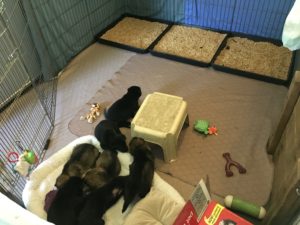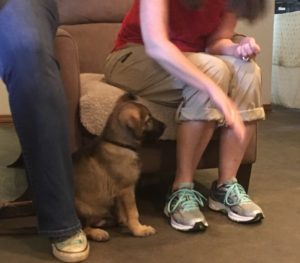Schedule Chaos And Learn To Love The Unexpected. Easy Transitions Part 4
Schedule or no schedule? Which is better and can it be both?
Breeders are often divided, even when they don’t know they are! I was so interested recently in a discussion on schedules in puppy raising. On the one side were the practical considerations: puppies have to eat frequently and are messy. Their needs require regular attention, this dictates some type of scheduling. On the other side were some very thoughtful ideas concerning teaching puppies to handle unexpected changes with confidence and the need for unpredictability in puppy raising. Maybe what we need is both predictably and unpredictability?
Create a feeling of security with a schedule.
Puppies are a schedule intensive creature, by making note of your puppy care schedule you can help both your family and the puppy. Make note of your typical feeding/cleaning schedule (for most breeders this is AM, Midday, PM and for breeders who do crate work, late PM potty breaks) as well as your training and crate conditioning routines. You can easily imagine how this might impact your puppy in it’s new home.
Most puppies will have owners who work during the day and many puppies can expect to be crated for some amount of time at night and during the day until fully house trained.
So, we try to work on crate conditioning with our litters during late afternoon. This occurs after morning clean up, meal, and play time, when the puppies are getting tired and ready for rest. At this point we do crate chews and naps.
It’s by design that we work on crate conditioning in our morning routine instead of our evening one. Because most puppies are going to experience crating during the daytime, whether they are companion, show, working, or sport dogs. So during the transition period our routine can help the puppy expect to spend some time during the day crated and napping. Further, knowing this routine can help our family during the transition period.
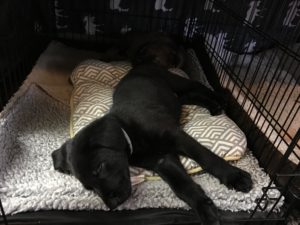
By knowing their new puppy typically naps after breakfast, the new family can schedule a nap time around the same time. Changes due to the families schedule can then be made gradually during the first week.
Create adaptability by throwing out the schedule!
We don’t want our puppy to be so habituated to a particular schedule that changes in routine are distressing. So while puppies really do require some scheduling of meals and cleanliness for their health and wellbeing, we can also create an happy anticipation of change by pairing random events with very enjoyable activities.
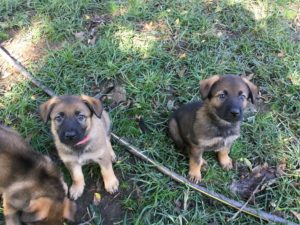
Puppies enjoying a noodle around the yard. Creating a joyful anticipation of the unexpected is easy!
Mix up your elective activities to create a love of the unexpected.
We can’t really just “not feed or clean up after” our puppies, that’s a given. Puppies require regular feeding and a clean environment. But all other activities (passive enrichment, active enrichment, crate conditioning, etc.) are elective activities that we can move around.
Further, since our puppies LOVE these elective activities (as they are paired with food, play, and learning) we can also create a happy anticipation of change by creating some randomness in these activities.
This is how I do that! I assign each activity a number, some tasks are listed twice because they need repeating more often.
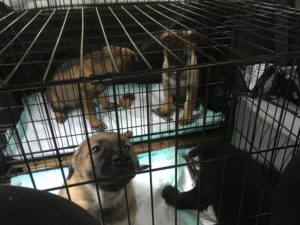
Unexpected crate time in the car! Crates and cars are great because we pair both with wonderful chews and thoughtful conditioning programs.
1. Passive Enrichment: Novel item(s), Pen toy resets.
2. Active Enrichment: Clicker Training Lessons
3. Puppy Scent Games: Puppy Tracking
4. Noodling: Yard exploration and play
5. Crate Conditioning: Crate chews, in house or car.
6. Nothing Time: puppies are left alone in the house.
7. Play: Fetch, Flirt, Tug games.
8. Nothing Time: We are home, but not interacting.
9. Grooming as Individual Attention
10. Active Enrichment: Clicker Training (this is twice, because we have lots of training to do!).
Then I download a free Random Number Generator onto my phone (from the App Store or Google Play) and set it from 1-10.
The Random Number Generator then gives me number that matches one of my elective activities. I do this activity during one of three free times, After Breakfast, After Lunch, or After Dinner. Since I know I can’t skip feeding or cleaning up after my puppies, this means I need to work variety in between these non elective scheduled tasks.
And of course, sometimes we don’t do anything!
This allows me to condition the puppies to both feel confident their needs will be met, and at the same time, that many fun and unexpected things are going to happen in any day.
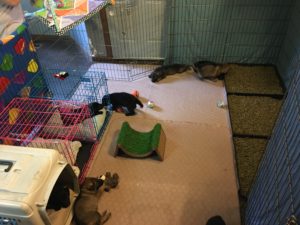
By including both alone at home, and ignored time in our rotation puppies learn to expect being unattended sometimes, even if we are home!
Note, I’ve included two types of “alone time” time when we leave the house and another time when we are home but not interacting with the puppies. Both happen as part of our regular schedule, but I want to ensure that the puppies have lots of experience with us leaving the house, as well as us being home but ignoring the them. This mirrors real life.
With just a little planning we can teach our puppies from the beginning that their needs will be met predictably, and further, that variations in schedule and unexpected things are wonderful and to be enjoyed! Both are needed to help puppies grow into well adjusted and adaptable adult dogs.

